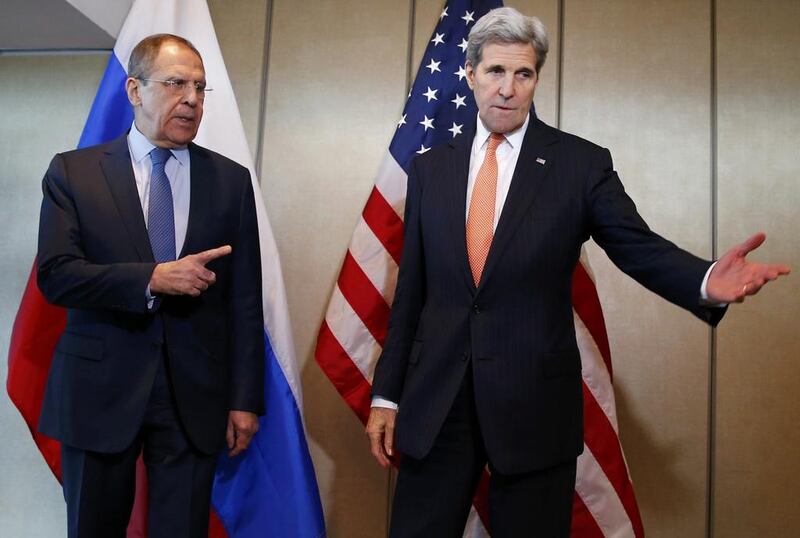BEIRUT // The timing of a ceasefire in Syria emerged as a key sticking point between the United States and Russia on Thursday as members of the 17-nation International Syria Support Group gathered in Munich to seek a way to end the country’s civil war.
Russia had proposed a ceasefire between rebels and government forces from March 1, according to US officials, who say that any truce must take effect immediately.
The Russian foreign minister Sergei Lavrov presented his US counterpart John Kerry with a ceasefire proposal at a meeting in Munich hours before the main meeting on Thursday and was awaiting for a response before bringing it to the rest of the Syria support group, the Russian foreign ministry said.
It did not give any details of the proposal and there was no comment from US officials.
As Syrian government forces backed by heavy Russian air strikes make major gains and move to encircle the northern city of Aleppo, Moscow has faced mounting international pressure to halt its bombing campaign and force a ceasefire.
While a halt in the onslaught would be welcomed by rebel forces and international actors such as the United States, there are fears that allowing the fighting to continue until March 1 will completely cut off supply lines to rebel-held eastern Aleppo, putting the area under siege.
The offensive on Aleppo led to the collapse of a first round of talks between the Syrian government and the opposition in Geneva earlier this month and the rebels say they will not return to fresh talks, pencilled in for February 25, unless government sieges and air strikes end.
However, Yury Barmin, a Moscow-based analyst who focuses on Russian Middle East policy, was not optimistic about the prospect of a ceasefire. He said some rebel groups could keep fighting even if Russia declared a ceasefire, while Moscow may not extend the truce to groups it considers terrorist organisations, such as Ahrar Al sham and Jaish Al Islam.
“Even if some kind of ceasefire is implemented on March 1, I still think there will be fighting,” Mr Barmin added. “I can’t imagine at this point that the groups will decide all at once to stop fighting and implement the ceasefire ... Especially given the fact that the Russian campaign and Syrian campaign have been so successful in the last month.”
The Syrian government offensive on Aleppo this month has already cut off the rebels’ main supply line to Turkey and threatens to close their last one. Facing intensive Russian air strikes in the countryside around Aleppo, rebel forces have been giving up territory quickly.
Given the effectiveness of the air strikes combined with Syrian government pushes on the ground, US officials are worried that if attacks continue for three more weeks, the rebels could be effectively crushed. Instead, Washington is calling for an immediate ceasefire and the granting of humanitarian access to besieged areas.
The US, Turkey, Arab Gulf states and other key players in the conflict have been backing rebel forces in the conflict and want a solution that explicitly includes the removal of Syrian president Bashar Al Assad from power. For them, a greatly weakened rebel force would impede their diplomatic goals.
Complicating matters in the area around Aleppo, the US-backed Kurdish militia known as the YPG has moved in and taken some of the territory that Syrian rebels have fled from. And in a move sure to further stoke tension, rebels claimed on Thursday that the YPG had attacked and seized the Menagh airbase north of Aleppo from them.
The YPG has fought rebel groups from time to time over the course of the Syrian conflict. There were major battles over disputed territory early on in the war, but of late both sides have been seen as trying to stay out of one another’s way.
Amid the latest military gains and diplomatic wrangling have come warnings of an alarming humanitarian crisis brewing in rebel-held areas of the country.
According to the International Rescue Committee, Russian and Syrian air strikes have forced nearly 100,000 people to flee their homes this month – 42,000 in northern Aleppo province and up to 50,000 in the southern province of Deraa.
On Thursday, a UN report said that 120,000 people in northern Homs province have seen their supply lines cut off by government forces since mid-January. Now, food supplies are running short, the prices of basic commodities are skyrocketing and patients without proper medical care are dying.
If Aleppo is besieged, it is feared that similar scenes could play out there. The United Nations has warned that 300,000 civilians in rebel-held areas of the city risk losing access to humanitarian aid if government forces succeed in encircling the city.
While Russia says it is ready to talk about a ceasefire, the intensity of its recent air strikes and Moscow’s continued hostile demeanour toward the US make its intentions a complicated read.
On Thursday, Russia’s ministry of defence said its planes had hit 1,888 targets in 510 combat sorties across Syria over the past week.
And the day before, a Pentagon spokesman accused Russian and Syrian government forces of bombing two hospitals in Aleppo.
Russia refuted the claim, saying it did not have any aircraft over the city on Wednesday and that only US-led anti-ISIL coalition aircraft had flown over that day.
It added that two US A-10 attack aircraft were observed striking targets in Aleppo on Wednesday afternoon.
This was rejected by the coalition, which said it did not carry out air strikes in or near Aleppo on Wednesday.
foreign.desk@thenational.ae
* With additional reporting by Reuters and Associated Press





